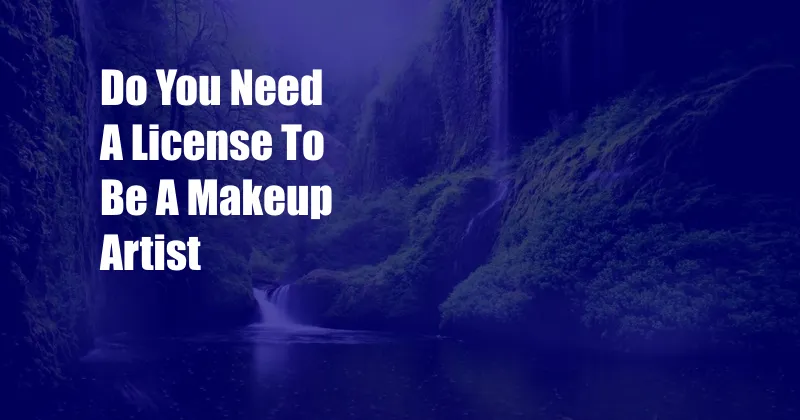
Do You Need a License to Be a Makeup Artist?
As someone who has always loved makeup and its ability to transform faces, I was curious about the legal requirements for becoming a makeup artist. Makeup is such a versatile and transformative art form that can enhance confidence and create beautiful works of art.
While I have always been fascinated by the artistry of makeup, I never considered the licensing aspect of the profession until I decided to pursue it as a career. To my surprise, the answer to the question of whether or not a makeup artist needs a license is not a simple yes or no. It varies depending on the location and the specific services offered.
Licensing Requirements: A Complex Landscape
The need for a makeup artist license varies greatly from state to state. In some states, such as California, makeup artists who work on film and television sets may need to obtain a cosmetology license. This is because they may be involved in more advanced techniques, such as special effects makeup or hair styling. However, in other states, no license is required for makeup artists who work in salons or on clients for special events.
Understanding Cosmetology Licensing
Cosmetology licenses typically require completion of a state-approved training program and passing an examination. These programs cover a range of beauty services, including hair styling, makeup application, and skincare. Obtaining a cosmetology license ensures that makeup artists have the necessary knowledge and skills to provide safe and professional services.
Exemptions for Special Event Makeup
In some states, there are exemptions for makeup artists who primarily work on special events, such as weddings or photo shoots. These makeup artists may not need to obtain a cosmetology license as long as they do not offer other services, such as hair styling or skincare treatments, that require a license.
Navigating the Legal Landscape: Expert Advice
To ensure you comply with the relevant laws and regulations, it’s always advisable to consult with your local licensing authority or a qualified attorney. They can provide specific guidance based on your location and the scope of services you plan to offer as a makeup artist. Here are some additional tips to help you navigate the legal landscape:
Obtain Insurance
Even if you are not required to have a license, it’s highly recommended to obtain insurance to protect yourself and your business. Insurance can provide coverage for liability, property damage, and other potential risks associated with your work as a makeup artist.
Stay Up-to-Date with Regulations
The laws and regulations governing makeup artistry can change over time. It’s essential to stay up-to-date on any changes to ensure you are compliant and avoid potential legal issues.
Maintain Professionalism
Regardless of whether or not you have a license, it’s crucial to maintain a high level of professionalism in your work. This includes adhering to industry best practices, using high-quality products, and providing excellent customer service.
Frequently Asked Questions: Clarifying Common Concerns
To further clarify the topic, here are some frequently asked questions and their respective answers:
Q: What happens if I work as a makeup artist without a license?
A: The consequences of working without a license vary depending on the state. In some states, you may face fines or legal penalties. It’s always best to check with your local licensing authority to avoid potential legal issues.
Q: Do I need a license to do makeup for my own events, such as weddings?
A: In most cases, you do not need a license to do makeup for your own events. However, some states may have specific regulations regarding makeup artists who work on others, even for special events. It’s advisable to check with your local licensing authority for specific guidelines.
Conclusion: Embracing Legality and Enhancing Your Craft
The decision of whether or not to obtain a makeup artist license is a personal choice that depends on your location and the services you offer. However, understanding the legal requirements and staying informed about industry regulations is essential to protect yourself and your clients.
By adhering to the relevant laws and embracing professionalism, you can establish yourself as a respected and skilled makeup artist. Whether you choose to pursue a license or not, the most important thing is to provide high-quality services, build a strong reputation, and continue to refine your artistry.
Are you interested in learning more about the fascinating world of makeup artistry? Let me know in the comments below, and I will be happy to provide additional insights and share my experiences.